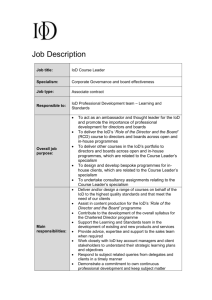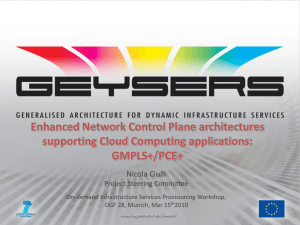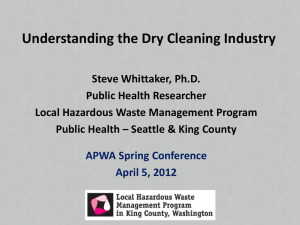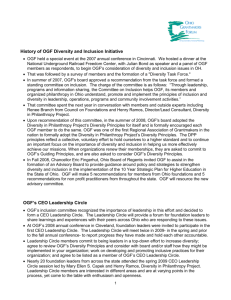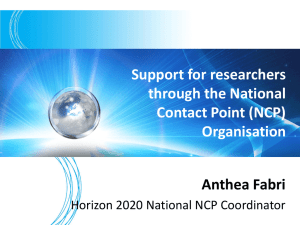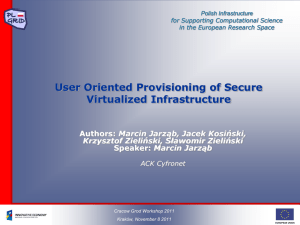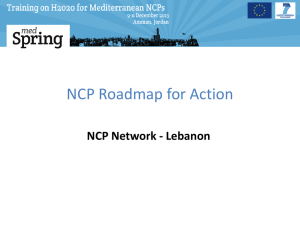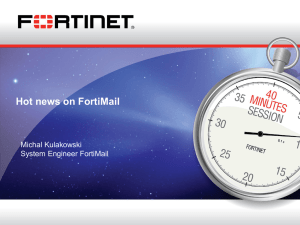GEYSERS_+ogf28_IoD+Workshop+Sergi+Figuerola
advertisement
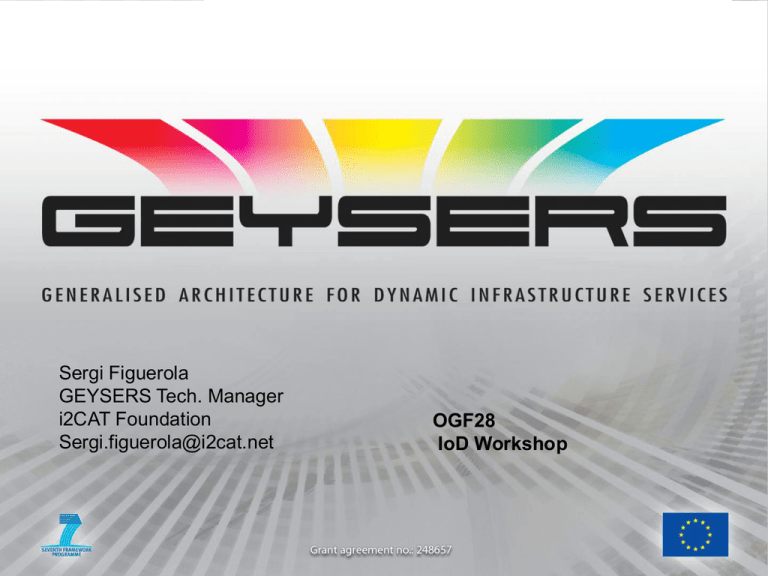
Sergi Figuerola GEYSERS Tech. Manager i2CAT Foundation Sergi.figuerola@i2cat.net OGF28 IoD Workshop Project facts sheet • Instrument: Collab. Project - Large Scale Integr. Project (IP) • Activity: ICT-2009.1.1 The Network of the Future, FP7 Call 4 • Project duration: 36 months • Project start date: January 2010 • Project budget: 10.433.205€ (7.035.000€ EC contribution) • Project resources: 947 person months OGF IoD workshop, March 2010, München 1 Consortium Pan-EU Carriers • Interoute (coordinator) Telecom Operators • Telefonica I+D • Polish PTT NRENs • Poznan Supercomputing and Networking Center (PSNC) Service Providers • SAP AG Telco manufacturers • ADVA Optical Networking • Alcatel-Lucent Italia SMEs • Nextworks, Martel Universities and Research Centres • • • • • • • • Fundació i2CAT University of Essex Institut National de Recherche en Informatique (INRIA) University van Amsterdam (UvA) Athens Information Technology (AIT) Technical University of Braunschweig (TUB) Interdisciplinair instituut voor BreedBand Technologie (IBBT) Indian Institut of Technology (IIT) OGF IoD workshop, March 2010, München 2 What is GEYSERS about? • An architecture and tools for the composition of logical infrastructures from physical optical networks and IT resources • An enhanced Network Control Plane (ASON/GMPLS + PCE) architecture and protocols to use these logical infrastructures to provide advanced transport services coupled with cloud services • Business cases where these two approaches can bring new value to infrastructure providers, network operators and app providers • Our methodology: architecture definition, design and prototyping, validation on a real pan-EU testbed OGF IoD workshop, March 2010, München Our problem statement • New emerging applications with highly demanding network & IT resource requirements, but still unable to exploit the potentialities of the current optical network technologies • Network layer unaware of applications’ dynamic requirements • Network and IT resources controlled separately without any integration between NCP and application layer • Optical infrastructure providers and network operators unable to provide enhanced and customized network services • Today just simple connection services over generic optical network infrastructures • Opportunities for new business models from the latest advances in network virtualization, physical resource partitioning and network control plane architectures: • Multiple virtual networks integrated with IT resource offered as a service to network operators • Virtual networks customized with enhanced NCP instances to support dynamic Network+IT provisioning services OGF IoD workshop, March 2010, München 4 Main goals GEYSERS a novel photonic network architecture for ‘Optical Network + AnyIT’ provisioning New business models and market approaches for network operators and infrastructures providers New Logical Infrastructure Composition Layer (LICL) Distributed and multi-site test-bed for experiments and performance evaluation Enhanced Network Control Plane (NCP) architecture and protocol extensions Outreach and standardization Proof-of-concept implementation of the LICL and NCP architectures OGF IoD workshop, March 2010, München 5 GEYSERS reference model Roles Application Application App/Service Providers Application Interface Network Control Plane (Extended ASON/GMPLS and PCE Control Plane) GMPLS+/PCE+ GMPLS+/PCE+ Logical Infrastructure Composition Layer IT Infrastructure IT: storage, computing Network Infrastructure optical infrastructure IT Infrastructure IT: storage, computing OGF IoD workshop, March 2010, München (virtual) Network Operators Infrastructure Providers Resources 6 Tech objectives - Logical Infrastructure Composition Layer (LICL) • Partitioning of the physical optical network and IT infrastructures resources through resource virtualization • Composition of network and IT resources from multiple providers in a logical abstraction of the underlying infrastructures • Dynamic creation of multiple isolated virtual infrastructures sharing the same physical resources • Management of static and dynamic resource sharing between infrastructure providers and network operators OGF IoD workshop, March 2010, München 7 Tech objectives – Network Control Plane • Advanced network support for cloud services: • seamless one-step provisioning of network+IT resources (NIPS: Network+IT Provisioning Service) • new network connection paradigms for the application layers (assisted unicast, restricted anycast, full anycast) • Logical infrastructure dynamic replanning • Enhanced TE in GMPLS/PCE “think of” and trigger underlying virtual infrastructure replanning • Dynamic provisioning, monitoring and recovery functions • Coordinated recovery escalation among LICL/NCP/[appl. layer] • Backward compatibility & interoperability • ASON/GMPLS and PCE • UNI and E-NNI interfaces • Interworking with std PCE/NMS for connection service provisioning OGF IoD workshop, March 2010, München 8 GEYSERS Pan-EU testbed OGF IoD workshop, March 2010, München Main innovation tracks & research challenges [1] AAA for infrastructure virtualization services GEYSERS LICL Multiple Network Operators each one with its own logical infrastructure Multiple switching technologies under the same Network Control Plane More dynamic and flexible infrastructure segmentation mechanisms Logical Infrastructure replanning Market place for exchange of logical infrastructure resources Support for Network Control Plane able to think of and trigger infrastructure replanning Uniform description languages for both network and IT resources OGF IoD workshop, March 2010, München 10 Main innovation tracks & research challenges [2] GEYSERS enhanced NCP Application dynamics and granularity at the user-network interface (NIPS) BoD services planned + provisioned by the NCP but optionally hocked to the NMS decision flow Scheduled BoD services handled by the NCP in a distributed/federated way AAA for net+IT provisioning services Extended communication paradigms • assisted unicast, • restricted anycast • full anycast New service composition dynamics at the SOA layer Cross-layer service monitoring and escalation of recovery procedures Energy-efficient network + IT resource routing and provisioning OGF IoD workshop, March 2010, München 11 Expected business impact • GEYSERS concepts will allow the development of new actors in the ICT environment • existing and emerging network operators, virtual infrastructure providers • GEYSERS approach will enable telcos to access new markets with new models • moving their business towards higher value application layers • IaaS in GEYSERS will strongly impact new business models • E.g. allowing to compose network + IT resources • Application and market expectations will drive the development of new business models based on GEYSERS concepts and outcomes • E.g. targeting CAPEX and OPEX optimization OGF IoD workshop, March 2010, München 12 An example scenario: the VNO VNO Customer (Network Service Gold Customer) VNO Customer (Cloud Service Provider) • No CAPEX for the VNO to enter the business • • • Specialized network(s) and related services; some advanced (cloud) • NCP stack providers • • Infrastructure Provider (IP) Infrastructure Provider (IP) E.g. for specific niches of customers (i.e. cloud service consumers or providers) Service provisioning NCP-based, to minimize OPEX Advantages for both parties: • Virtual Network Providers Virtual network infrastructure hired from Infrastructure Providers or Virtual Network Providers NCP controllers licensed by stack providers • • • Telcos can rent out parts of their infrastructure to maximize utilization (becoming IPs) reduced CAPEX and time-to-market for the VNO pay-as-you-grow model and SLAs: depending on the business the VNO can rent more or release resources (even automatically with NCP TE dynamics and timescale) flexibility to easily cover new customer application demands (e.g. clouds, Net+IT) with dedicated virtual networks OGF IoD workshop, March 2010, München 13 Thank you. Questions? www.geysers.eu Sergi Figuerola GEYSERS Tech. Manager i2CAT Foundation sergi.figuerola@i2cat.net
